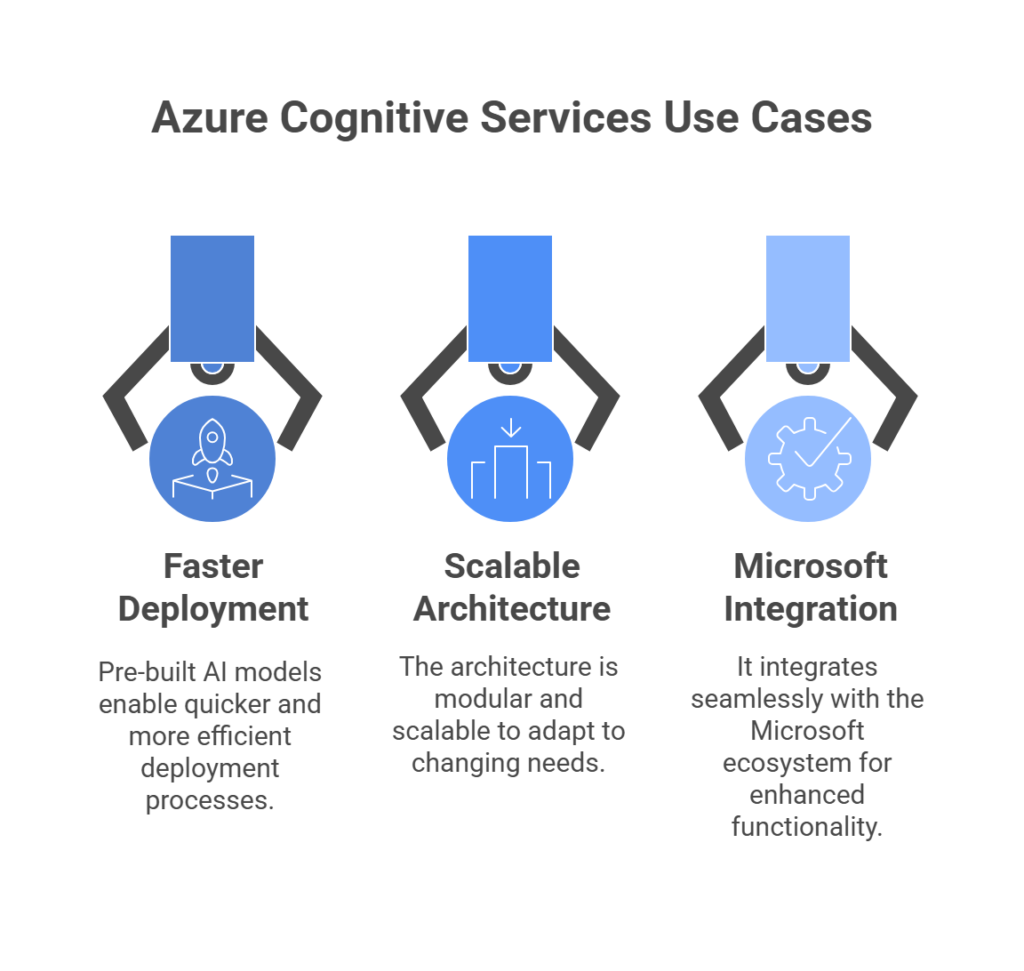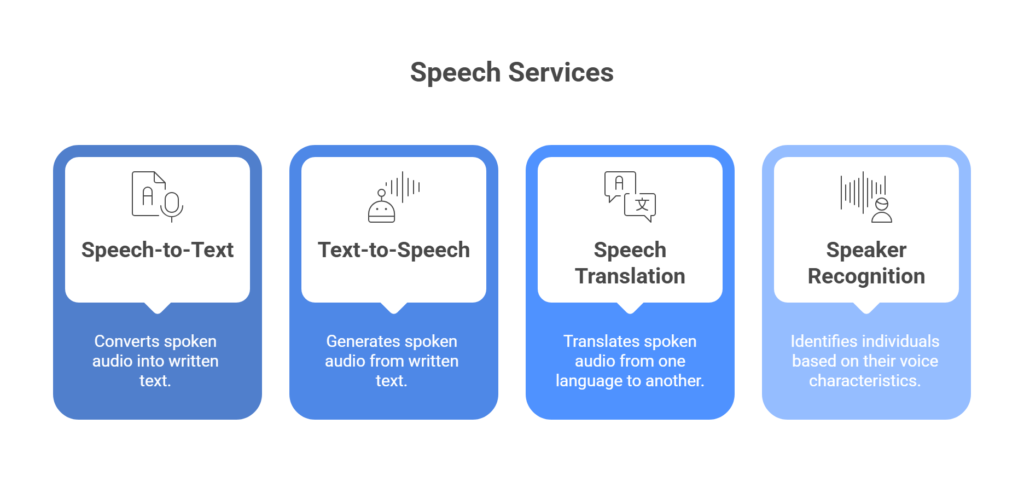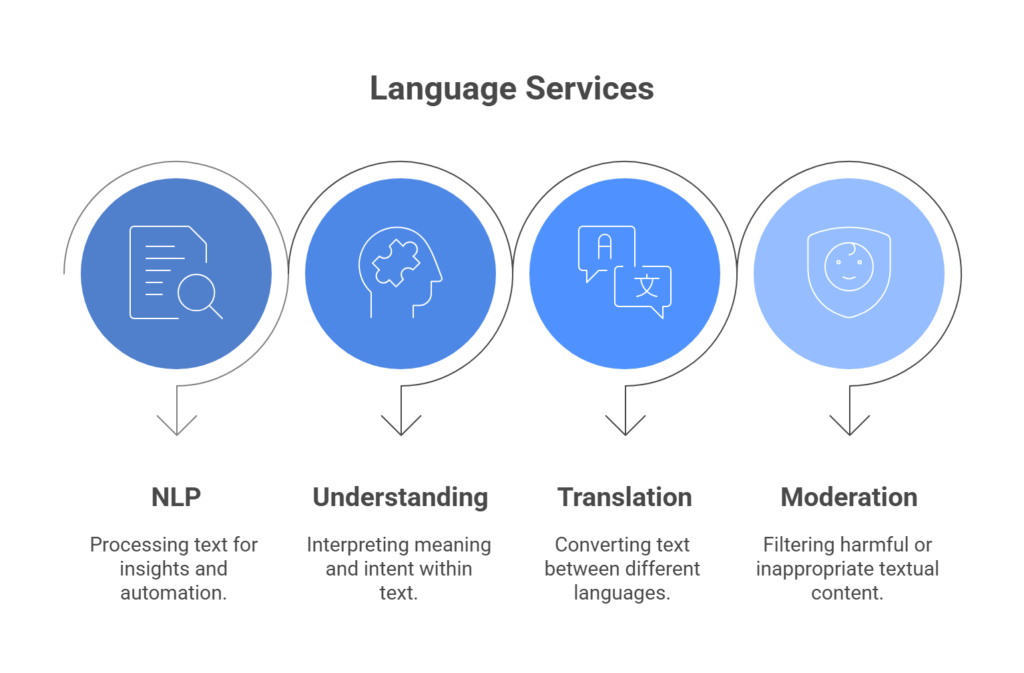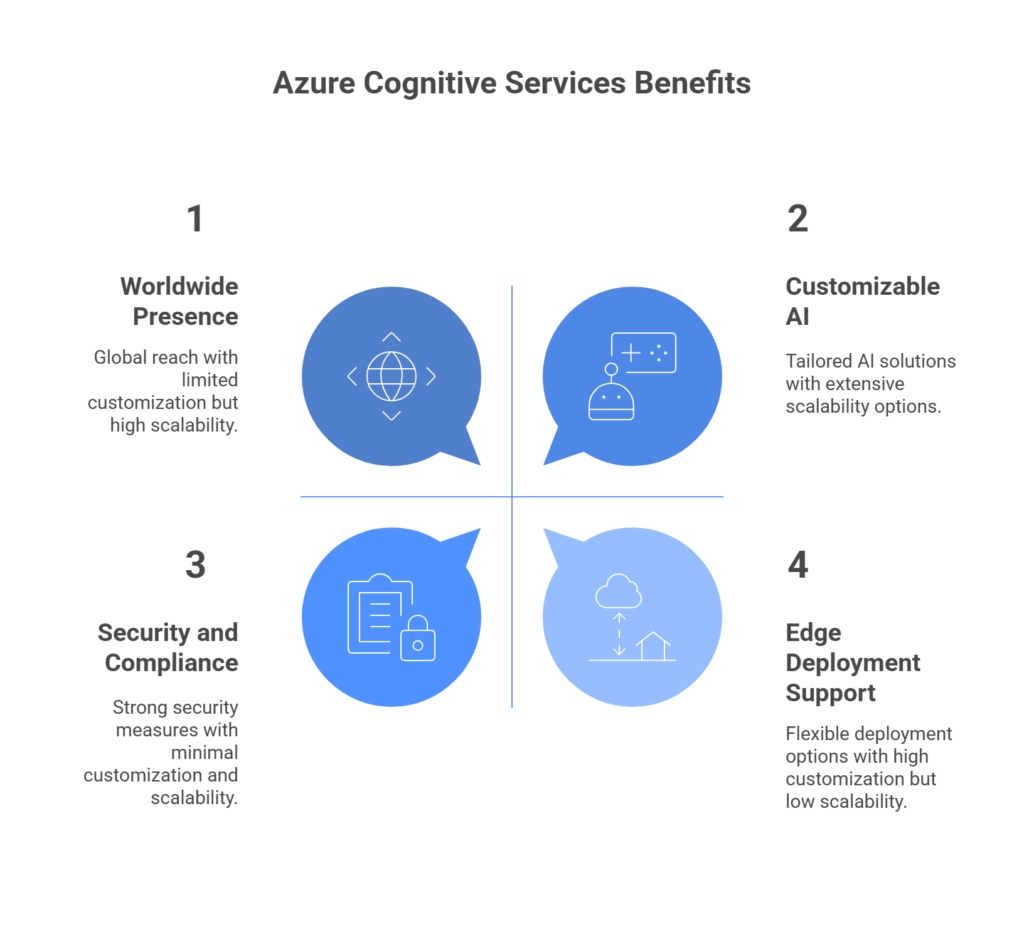Real-World Azure Cognitive Services Use Cases in 2025

Due to rapid AI adoption across industries, business practitioners are actively seeking avenues for real applications that lay an actual, economic claim on value. Placed in the middle of this change are Azure Cognitive Services use cases, real instances where Microsoft’s AI power helps businesses in either automating processes, improving customer experience, or innovating.
Whether it’s about automating document processing, creating an intelligent search, or offering real-time translations, these services by Azure give developers ready-made AI models that are easily inserted into existing apps according to their requirements.
Microsoft Cognitive Services provides detection of AI capabilities, which include machine vision, speech recognition, natural language understanding, and decision-making models. Enterprises use these services for advanced capabilities like image analysis, sentiment detection, or personalized recommendations without expending resources in building far too complex machine learning models from scratch.
In this blog, we unwind the Azure Cognitive Services use cases spanning the retail, healthcare, manufacturing, and finance domains. You will discover how firms build-for-advantage upon these AI services: facial-recognition-aided security enhancements or customer support improvements enabled by intelligent chatbots.
If building smarter, AI-powered solutions that scale is your ambition, Azure Cognitive Services provide a suitable avenue that is fast, flexible, and cost-effective. Now it’s time to jump into enterprise-ready Azure AI real-life examples.
Table of Contents
The Foundation of Impactful Azure Cognitive Services Use Cases
One must grasp the basis behind these services in order to really respect the impact of real-world Microsoft Azure Cognitive Services use cases. These services are a set of powerful AI-driven APIs that allow software developers to imbue intelligence into their applications with ease. Using these services, pre-trained models allow enterprises to automate operations, improve customer experience, and build smarter solutions without deep data science expertise.
These services are offered through the larger Microsoft Azure AI ecosystem and are broken into four major domains: Vision, Speech, Language, and Decision. Human-like intelligence is conferred upon various operations in these domains-from mere recognition of faces in photos to real-time conversation translation.

1. Pre-Built AI Models for Faster Deployment
In essence, the Cognitive Services by Azure are designed via APIs and SDKs so that they may be rapidly prototyped and deployed at scale. Developers entertain the call of these services directly from their applications and hence need not design and train machine learning models from scratch.
Another real-world Azure Cognitive Services examples in the retail industry involves a retailer using the Vision API to identify items from images uploaded by the customers or analyzing review texts using the Language APIs for sentiments. These are just a few examples across the industries.
2. Modular and Scalable Architecture
Another superpower of this use case is its modularity. You can begin with just a single API, say, OCR for document scanning, and combine it later with other services for accompanying needs, like translation or personalization.
Such an architecture will allow for scaling, as businesses roll out the application of cognitive intelligence in targeted ways over time. Azure is also pay-per-consumption, therefore making it cost-effective and accessible to startups and enterprises alike.
3. Seamless Integration with Microsoft Ecosystem
Being native to the Microsoft Azure cloud platform, the services integrate very well with other Azure tools such as Azure Machine Learning, Azure Functions, and the Power Platform, affording a unified environment of Azure AI development for building intelligent, data-driven applications.
As we proceed through the next set of sections, we shall observe the services being applied in particular cases, each demonstrating that Azure Cognitive Services use cases can deliver real and measurable business outcomes.
Talk to an Azure AI Expert
Vision Services – Making Visual Data Actionable
The Azure Vision services present AI at its best for image and video understanding and interpretation. It is capable of detecting faces, recognizing objects, extracting text, or even checking if image content is appropriate for compliance purposes. Most common Azure Cognitive Services use cases are those oriented around their Vision APIs in drawing insights from what is seen in retail, health care, security, or logistics.
Now, let’s look at the various offerings of the Vision services in converting visual content into actionable insights for businesses.
1. Image and Video Analysis
Azure AI applications allow to identify objects, faces, colors, emotions, and scenes from images or video frames. Common industrial use of this is in fields where images or visual data still take central place.
Use Case Example: In the retail industry, it is implemented to classify products automatically and detect the accuracy of shelf placement. Medical image recognition is also implemented to analyze X-ray or MRI scans for diagnosis. In public safety, the real-time analysis of video data recognizes suspicious activities and traces the whereabouts of missing persons.
2. Optical Character Recognition (OCR)
OCR captures text content from scanned documents and images, and even handwritten notes into a program, minimizing manual entry and reducing errors in document-heavy workflows.
Use Case Example: OCR will be applied by logistics companies to automatically capture shipping label data, and it will also be used in finance departments for invoices and receipts so that they can be processed rapidly and precisely.
3. Content Moderation
Content Moderator API automatically detects adult or offensive content within images and videos. This is crucial to any platform that depends on user-generated content or places safeguarding of the user environment as the highest priority.
Use Case Example: E-commerce screens customer-uploaded product images. Social media applications apply marketing moderation standards to user profile photos and content.
4. Custom Vision
With Custom Vision, businesses can create their own models to discern objects or situations specific to their fields, presenting the models with only a few labeled images.
Use Case Example: A manufacturer might train a model to detect defective products on the assembly line, while a logistics provider might evaluate how well they detect certain types of vehicles or packaging conditions during delivery inspections.
Speech Services, Powering Voice-Driven Experiences
In the world expanding on a voice-first approach, speech technologies change how people interact with devices and applications. Azure Speech services make it so easy to imbue voice recognition, transcription, translation, and synthesis capabilities to your offerings. One of the common major Azure Cognitive Services use cases is Speech to offer better accessibility, automated communication, and user experience.
Let’s explore how Azure speech abilities engender improved, human-like exchanges across different industries.

1. Speech-to-Text
The Azure Speech-to-Text API can convert spoken language into written format with great accuracy under noisy surroundings. It supports real-time streaming and batch transcription in various languages.
Use Case Example: Legal firms transcribe court proceedings, and health-care providers record patient consultations. Customer service departments use this to automate logging of calls to better analyze and comply.
2. Text-to-Speech
It produces life-like speech out of text input using neuromorphic voices. Support is given for natural-sounding voices in various languages and regional accents.
Use Case Example: Navigation is addressed and announced on the fly, whereas e-learning provides a conversion from course content to audio for visually impaired people and people who are mobile.
3. Speech Translation
Speech Translation makes an area of real-time unlimited-language conversations.
Use Case Example: Travel companies and international call centers use the process to communicate across languages between employees and customers. It is also used for dynamic subtitles for webinars or international events.
4. Speaker Recognition
This biometric-tool-based system recognizes or verifies someone based on his voice signature. It operationalizes the alternate security and personalization for voice-commanded things.
Use Case Example: Banking apps grant access via voice authentication, whereas in certain enterprise environments, users are verified through voice in virtual meetings.
From court transcripts to multilingual conversation, these speech services open new vistas concerning accessibility, automation, and personalization, while proceeding to the following section, where the work expands, focusing on language-related intelligence.
Language Services – Unlocking the Full Potentials of Text
Being at the center of human communication, Language, according to Azure, takes the large-scale mechanism for machines to analyze, comprehend, and articulate in natural language. These services assist organizations in making sense of text data at scale-from analyzing customer first impressions to running chatbots. A majority of high-impact Azure Cognitive Services use cases fall into language functionalities, predominantly customer support, content management, and multilingual interaction.
Let’s shed some light on the key language offerings and alterations in sectors that bring enterprises.

Natural Language Processing (NLP)
When given unstructured text, Azure Cognitive Services applications derive salient sentiments, key phrases, named entities, and even the language of the text. Intent can be analyzed from user input or documents, as can trends, emotions, can be analyzed.
Use Case Example: The marketing team tracks brand sentiment from social media posts; HR will go over the feedback from employees; while the support team will classify customer inquiries automatically.
Language Understanding (LUIS)
Language Understanding Intelligent Service enhances the ability of applications and bot frameworks to comprehend users’ intentions and respond in context, allowing developers to build domain-specific models tailored for distinct business needs.
Use Case Example: Virtual banking assistants accept instructions such as “Show me last month’s transactions” or “Transfer ₹5,000 to savings” and initiate conversational self-service with customers.
Text Translation
The Azure Translator provides translation for more than 100 languages and dialects for global conversations and content localization.
Use Case Example: Listings on e-commerce portals are translated into languages in which target countries communicate, and translation services are being used by multinational teams to overcome language barriers.
Content Moderation
This service will identify offensive, profane, or inappropriate language in user-generated content. It supports several languages and context-based filtering.
Use Case Example: Online forums, e-learning portals, and social media networks use the service to ensure that the environment remains respectful and in line with content policies.
From sentiment analysis to real-time translation, Azure Language service tools allow one to work on and understand text-based data. They keep on setting the benchmark worldwide in Azure Cognitive Services use cases, especially in scenarios where human-like understanding of language contributes immensely to commercial success.
Decision Services – Intelligent Business Outcomes at Play
Vision, speech, and language tend to be the aspects of perception and communication of an application. Meanwhile, Azure Decision Services are centered on action-taking. Decision Services use real-time data and artificial intelligence to make context-aware decisions, generate a list of personalized recommendations, and spot anomalies in actions. Most strategic Azure AI use cases fall under this umbrella, and few intelligent systems adapt continuously and intelligent collections are presumed to create optimal business processes for favorable outcomes.
Let’s jump further into the grains of each substantial Decision service with tight integration on measurable enterprise operational impact.
Personalizer
Using reinforcement learning, Azure Personalizer synthesizes Personalizer that creates a personalized content, experience, or action to tailor for a single user, constantly updating its recommendations in real-time in response to changes in user behavior.
Use Case Example: Media portals recommend news headlines, and videos tailored to each user. E-commerce lists products and advertises homepage banners differently based on a shopper’s last interaction.
From content personalization within milliseconds to seeing edificatory interesting yet fragile irregularities within financial-industrial data sets, the Decision Services enable a business entity to make choices with observation-based insights. Further, these intelligent APIs examine the Azure Cognitive Services use cases in real-time customer satisfaction, operations, and risk management.
Explore AI Solutions Now
Beyond Basics – Expanding Use Cases Across Industries
Apart from the basic Vision, Speech, Language, and Decision services, Cognitive Services by Azure provides many possibilities for compound solutions that bundle multiple capabilities and attempt to solve complex business problems. Advanced implementations are intelligent chatbots, search engines, fraud detection systems, and much more. These are some coveted Azure Cognitive Services use cases that illustrate how enterprises combine various AI components to establish seamless smart experiences that respond to the user in real-time.
Intelligent Chatbots
Using LUIS, Speech, and Decision, an environment for smart chatbots can be created where these chatbots provide natural, humane conversations. Besides answering FAQs, these bots accept service requests and act upon transactional workflows.
Use Case Example: Airlines have their bots to generate complaints relating to flight issues, cancellations, and check-in. Likewise, banks use their bots to take inquiries on accounts and the transfer of funds in real time.
Intelligent Search
Powered by AI, Azure Cognitive Search brings context-aware semantic relevant results instead of plain keyword-based matching of results. It indexes content, understands the meaning, and ranks the result on the basis of the user’s intent.
Use Case Example: In the healthcare domain, intelligent search brings up patient records or clinical research. At enterprises, intelligent search provides instant access to policies, knowledge articles, and project documentation to employees.
Fraud Detection
Fraud Detection, in combination with anomaly detection, vision, and language services, can be employed by Azure to provide clients with the ability to track suspicious behavior across different regions, channels, and mediums.
Use Case Example: Fraud detection systems enable e-commerce platforms to monitor transactions for false returns or unauthorized accesses, curtailing financial losses, and increase the level of trust.
Predictive Maintenance
Manufacturers may use Vision APIs to detect visual defects and pair sensor data and anomaly detection together, predicting equipment failure.
Use Case Example: Through the installation of cameras and IoT sensors, the smart factory monitors its machinery in real time and then schedules maintenance only when necessary so as to avoid costly downtimes.
Personalized Recommendations
Azure Personalizer and other data-driven APIs can customize the experience for users in e-commerce, media, and digital platforms of learning.
Use Case Example: Intelligent recommendation systems are being used by streaming services to suggest new shows, online stores for additional products, and e-learning apps to customize lesson plans with respect to individual progress.
Just in these multi-service solutions, one gets a glimpse of the versatility and power of Azure Cognitive Services use cases when applied strategically. In the next section, we shall go into how various industries are embracing these tools at scale to gain competitive advantage.
Industry Adoption – Azure AI in Action
The true impact of AI does not lie purely in technology; rather, it exists in how globally oriented industries harness it to solve real-world challenges. From health care to manufacturing, enterprises find all kinds of novel methods of embedding AI into their day-to-day operations. Many of the more interesting Azure Cognitive Services use-cases are the implementations geared toward a particular industry that improve efficiency, accuracy, or decision-making processes across whole organizations.
Let us see how Azure Cognitive deployed by various sectors on the transformation of their services, products, and operations.
Healthcare
In the healthcare industry, Cognitive Services by Azure improve the accuracy of diagnoses, administrative efficiency, and patient engagement. OCR and Form Recognizer capture data from medical records, while speech-to-text aids clinical documentation.
Use Case Example: Hospitals use Vision APIs to analyze medical scans and X-rays, with voice recognition enabling doctors to document cases hands-free; thereby reducing administrative burden and enhancing the quality of patient care.
Retail and eCommerce
Retailers use Azure AI to enhance personalization for shopper experiences, automate content moderation, and manage inventory using image recognition and anomaly detection.
Use Case Example: Computer Vision is used in e-commerce to automatically categorize products, while Personalizer is used to provide personalized product recommendations based on browsing activity.
Financial Services
Finance uses Azure AI to improve security, detect fraud, and enrich customer relations. Language understanding and anomaly detection are instrumental in these four Azure Cognitive Services use cases.
Use Case Example: Azure is used by banks for fraud detection against transactions grounded in real time and LUIS-powered bots respond to account-related queries, providing support 24/7 with personalized service.
Manufacturing
In manufacturing, Microsoft’s Cognitive Services are used for quality control, predictive maintenance, and safety monitoring, using a combination of vision, decision, and speech services.
Use Case Example: Smart factories use Custom Vision to detect defects in parts at assembly lines. Anomaly detection flags abnormal machine behavior, allowing for proactive maintenance, thus minimizing costly downtime.
Education
Educational bodies use Azure AI to support a prepared learning environment and automated administration. Text-to-speech and translation services support such integral learning.
Use Case Example: Some universities use Translator to share course content in multiple languages, while Text Analytics is used to score open-ended student feedback in massive amounts.
These real-world instances test the range and depth of Azure Cognitive Services use cases. From saving lives to selling more products, industries are now powered by Azure AI to bring smarter, faster, and more human-centric outcomes.
Why Choose Azure Cognitive Services?
With the vast range of AI platforms currently available, enterprises tend to go with Microsoft Azure for cognitive solutions on a consistent basis. In terms of pure infrastructure power, pre-trained models, and enterprise-grade scalability, Azure is the strongest player out there. It is the flexible implementation that has allowed an almost infinite number of Azure Cognitive Services use cases, from small automations to systems of higher importance-across a variety of industries.
Let us delve into why Azure Cognitive Services have become an excellent choice among businesses looking towards the adoption of AI technology.

Comprehensive AI Casualties
Span across text analytics and translation to computer vision and voice biometrics, Microsoft Cognitive Services shall encompass vast AI-related purposes under one roof, thus enabling richer multi-modal user experiences.
Security and Compliance
Having great investments for enterprise-grade security, privacy, and compliance, Microsoft builds Cognitive Services with respect to these three principles, hence offering features of responsible AI, GDPR compliance, and option for data residency.
Customizable AI
Customizing AI according to particular industry needs will thus make the solution more relevant, accurate, and business-specific. Thus, such services include Custom Vision, Custom Neural Voice, and Language Understanding (LUIS).
Worldwide Presence
Being offered in various regions worldwide, Cognitive Services by Azure offers high and low availability and low latency while ensuring compliance with the data laws of the specific regions.
Multilingual and Multi-Modal
It supports more than 100 languages for text and speech processing, promoting worldwide communication in greater capacity. It also produces multimodal data from disparate content types, texts, sounds, images, and videos, within one unified AI ecosystem.
Production-Grade APIs
These APIs are built and certified by 99.9% SLAs for availability to operate on the highest-grade production within huge implementational workloads. This gives assurance to enterprise applications regarding uptime and consistent performance.
AI Innovation at Scale
These services by Azure, powered by Microsoft Research and OpenAI, keep abreast of innovation with state-of-the-art transformer models, responsible AI, and ethical guardrails to ensure accuracy, fairness, and explainability.
Edge Deployment Support
AI models can be deployed at the Edge using containers. This is particularly suitable for situations when Internet availability is patchy or unavailable, such as in manufacturing plants, remote sites, or on some IoT devices-one way to guarantee real-time processing and ensure privacy of data.
The most significant pay-as-you-go-model
Flexible price plans are offered by Azure, with the option to pay for the processing used. This allows for start-ups to gain access, while at the same time allowing formulations to scale and produce measurable ROI, with minimal upfront investment.
Conclusion
From vision and speech to language and decision-making, Azure] offers a unified, scalable, and enterprise-ready approach to AI adoption. The wide range of Azure Cognitive Services use case examples we’ve examined, from predictive maintenance and fraud detection to intelligent bots and personalized learning, demonstrates just how versatile and powerful these services are across various industries.
Whether you are trying to improve workflows, customer interactions, or new business models, Azure AI can lay the foundations to achieve these goals far quicker. With its low-code APIs, cloud-native experience, and infrastructure trusted by Microsoft, bringing intelligence into applications is something that can hardly become more straightforward.
If your organization is looking to stay competitive, innovate faster, and scale smarter, now is the perfect time to connect with us here.
Frequently Asked Questions
1. What can one do with Azure Cognitive Services?
Azure Cognitive Services are used to inject some AI-like capabilities into an app, including vision, speech, language understanding, and decision-making, without having to build machine learning models from scratch. Some Azure Cognitive Services use cases are face identification, speech-to-text, text translation, intelligent search, and anomaly detection.
2. Can it be customized for a business need?
Yes. While the services come pre-trained and are ready to use, some components, like Custom Vision and LUIS, allow businesses to train models specific to their industry or workflow, thereby enabling highly targeted use cases for Azure Cognitive Services.
3. Which industries will stand to gain a lot from Azure Cognitive Services?
Industries like healthcare, finance, retail, manufacturing, and education disperse Azure Cognitive Services widely. These services enable activities related to predictive maintenance, fraud detection, customer personalization, medical imaging analysis, and multilingual content delivery.
4. Are Azure Cognitive Services secure and compliant?
Absolutely, Developed out of the Microsoft Azure cloud platform, these services offer a variety of compliance certificates such as GDPR, HIPAA, ISO, and FedRAMP. Enterprises can choose to implement AI without fearing the compromise of data privacy or any regulatory issue.
5. How about getting started on Azure Cognitive Services?
You start by going to the Official Azure Cognitive Services page, where you have access to documentation, quick-start guides, free trials, and SDKs for integration. Azure also has AI Studio for developers and Azure Marketplace for ready-to-use solutions.



